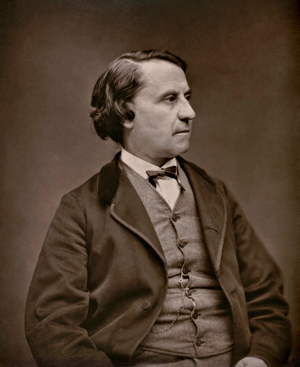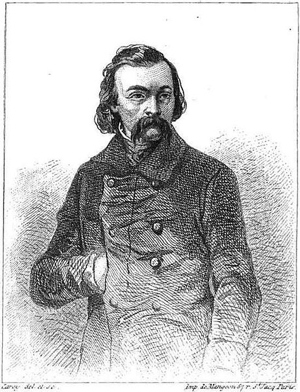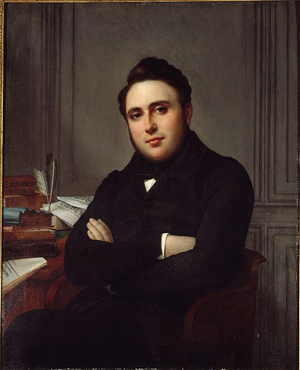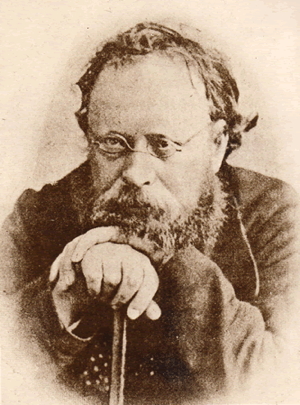
Louis Blanc (1811-1882)
When I was researching Frédéric Bastiat’s series of anti-socialist pamphlets which he wrote between 1848 and 1850 I looked at the works of the main socialist theorists who were the subject of his ire (Louis Blanc, Victor Considerant, Ledru-Rollin, and Joseph Proudhon). Out of this I drew up a list of their main objections to private property and the free market. These socialist writers also provoked a spirited response from the political economists (Charles Dunoyer, Michel Chevalier, Léon Faucher) who in turn wrote a series of critical works to rebut these criticisms in the period between 1845 and 1853, of which Bastiat’s essays were only a small part of a larger whole but which were of special note for their wit and cleverness.
I plan to put online as many of the works (both pro- and anti-socialist) online as I can. Also, in a series of posts I plan to outline the main criticisms of markets and wage labour by the socialists, the response by the political economists, beginning with the French and then moving on to the English and Germans.
I will begin with the French socialists because Paris and the intellectuals who gathered there played a very important role in the emergence of socialist ideas in the first half of the 19th century. The French form of socialism can found in a variety of flavors:
The so-called “utopian socialists” who wanted to create model socialist communities on a voluntary basis in which the superiority of socialist ways of living and working could be demonstrated to others. This group included Saint-Simon (1760-1825) and Charles Fourier (1772-1837) and their major works were:
1. Saint-Simon, L’Organisateur (1819-1820) and Du système industriel (1822)
2. Charles Fourier, Le Nouveau monde industriel et sociétaire (1829-30).

Victor Considerant (1808-1893)
The electoral or political socialists who wanted to work within the electoral system and to introduce legislation in order to regulate the “capitalist” or free market system and to encourage the creation of alternative ways of organizing labour and production, where the state would guarantee jobs for every worker (“le droit au travail” (the right to a job)) which would be paid for by taxpayers. In order to do this, the voting franchise had to be expanded to allow ordinary working people to vote (this was severely limited in pre-1848 France), and these new voters had to be persuaded to vote for socialist candidates in the elections. Gustave de Molinari called this kind of socialism “socialism from below.” The main theorists of and political activists in this form of socialism were Louis Blanc (1811-1882), Victor Considerant (1808-1893), and Alexandre Ledru-Rollin (1807-1874). It should be noted that Considerant wrote a “socialist manifesto” the year before Karl Marx wrote his famous Communist Manifesto in February 1848, and Ledru-Rollin later that same year. Their main works include:
1. Louis Blanc, Organisation du travail. Association universelle. Ouvriers (1841) in French HTML and English HTML; and Le Socialisme. Droit au travail, réponse à M. Thiers (1848)
2. Victor Considerant, Principes du Socialisme. Manifeste de la Démocratie au XIXe siècle (1847) in French HTML and English HTML; and Droit de propriété et du droit au travail (1848)
3. Ledru-Rollin, “The Election Manifesto of the Montagnards” (Manifeste des représentants de la Montagne) (Dec. 1848)

Alexandre Ledru-Rollin (1807-1874)

Pierre Joseph Proudhon (1809-1865)
The anarchist socialism of Pierre Joseph Proudhon (1809-1865) which combined aspects of utopian socialism (workers starting and running their own workshops outside of the state) and electoral socialism (using the government’s taxing and regulating powers to set up a “People’s Bank” to offer low or zero interest rate loans to these workshops). Proudhon’s main works from this period are:
1. Qu’est-ce que la propriété? ou Recherches sur le principe du Droit et du Gouvernement (1840) in French HTML and English HTML; Système des contradictions économiques, ou philosophy de la misère (1846); Le droit au travail et le droit de propriété (1850); and his debate with Bastiat on Free Credit (1850)
The bureaucratic or state socialism of political leaders like Louis Napoléon Bonaparte (Napoleon III 1852-70) who used the power of the state run by elites to introduce socialist measures “from the top down”. Molinari called this form of socialism “socialism from above”. It would be continued under Otto von Bismarck in the Second German Reich (1871-1918) between 1883-89 when the foundations of the modern welfare state were laid down. Louis Napoléon Bonaparte had been influenced by the socialist ideas of Saint-Simon as he shows in his books Des idées napoléoniennes (1839) and L’Extinction du paupérisme (1844).
Mention shield also be made of the revolutionary or so-called “scientific” socialism of Karl Marx (1818-1883) who lived and worked in Paris 1843-45, Brussels 1845-48 (where he attended a meeting of the free market Congress of Economists in 1847 to deliver a speech critical of free trade), and Paris 1848-49. His major works from this period include:
– Economic and Philosophic Manuscripts of 1844 (The Paris Manuscripts) written while he was living in Paris
– Wage Labour and Capital (1847)
– Undelivered speech in Brussels to the Congress of Economists attacking free trade, “The Protectionists, the Free Traders and the Working Class” (16 and 18 September 1847)
– Manifesto of the Communist Party (1848) presented to the German Workers Association in Paris in February 1848
– these early writings would be consolidated into his more mature works such as Grundrisse (Sketch of a Criticism of Political Economy (1857); A Contribution to the Critique of Political Economy (1859); and Capital, Vol. I (Das Kapital) (1867)
The French socialists had an opportunity in the early months of the February Revolution of 1848 to put some of their ideas into practice with the National Workshops scheme run by Louis Blanc. This was the first attempt to create a modern welfare state, and was the precursor of what would emerge after WW2 in western Europe, UK, and later USA. The idea was for the state to provide tax-payer funded employment for those who were out of work as the first step towards a universal state-guaranteed “right to a job” (droit au travail), a measure which they also tried to make part of the new French constitution which was debated over the summer of 1848.
This is how Louis Blanc in 1841 conceived the role of government in running the “ateliers sociaux” (social workshops) which would replace private firms operating in a free market and which he attempted to put into practice in 1848:
Le gouvernement serait considéré comme le régulateur suprême de la production, et investi, pour accomplir sa tâche, d’une grande force.
Cette tâche consisterait à se servir de l’arme même de la concurrence, pour faire disparaître, la concurrence.
Le gouvernement lèverait un emprunt, dont le produit serait affecté à la création d’*ateliers sociaux* dans les branches les plus importantes de l’industrie nationale.
Cette création exigeant une mise de fonds considérable, le nombre des ateliers originaires serait rigoureusement circonscrit; mais, en vertu de [103] leur organisation même, comme on le verra plus bas, ils seraient doués d’une force d’expansion immense.
Le gouvernement étant considéré comme le fondateur unique des *ateliers sociaux*, ce serait lui qui rédigerait les statuts. Cette rédaction, délibérée et votée par la représentation nationale, aurait forme et puissance de loi.
Seraient appelés à travailler dans les *ateliers sociaux*, jusqu’à concurrence du capital primitivement rassemblé pour l’achat des instruments de travail, tous les ouvriers qui offriraient des garanties de moralité.
The government ought to be considered as the supreme regulator of production, and ought to be invested with great coercive powers in order to carry out its task.
This task would entail using the weapon of competition itself in order to make competition disappear.
The government would raise a loan the proceeds of which would be used to create *social workshops* in the most important sectors of national industry.
This creation (of workshops) would require the investment of considerable funds and the number of of workshops would at first be strictly limited; but in virtue of the fact of their very organisation, as one will see below, they would be endowed with a huge power of expansion.
Since the government would be considered to be the sole founder of these *social workshops,*it would be it (the government) which would draw up the statutes. This document, deliberated and voted upon by the national representative body would have the form and power of the law.
All workers who could offer guarantees of their moral (uprightness) would be called upon to work in the *social workshops*, until (enough) primitive capital had been gathered to purchase the tools of work.
Source: “Conclusion. De quelle manière on pourrait, selon nous, organiser le travail” in Louis Blanc, Organisation du travail. Association universelle. Ouvriers. – Chefs d’ateliers. – Hommes de lettres. (Paris: Administration de librairie, 1841. First edition 1839), pp. 76-93.
What is important for our purposes here is that is was during this period that the basic socialist criticisms of the free market were first expressed at some length and with some coherence, and solutions proposed (usually involving state ownership, regulation of economic activity, and transfer payments to the poor and unemployed) which would remain essentially the same for the next hundred years or so.
I will describe the socialists criticisms of the free market and wage labour and the response by the political economists in another post.
